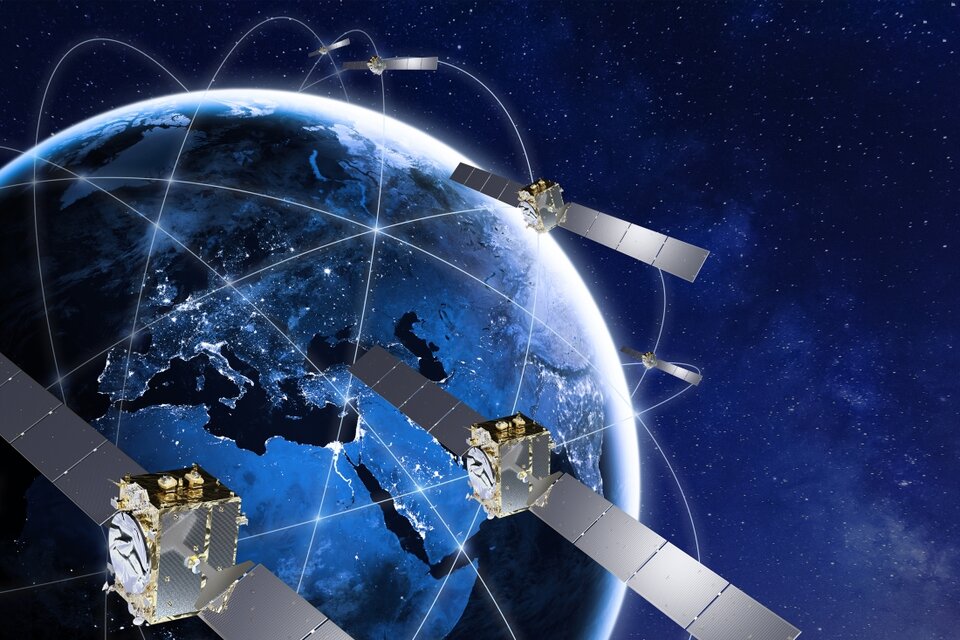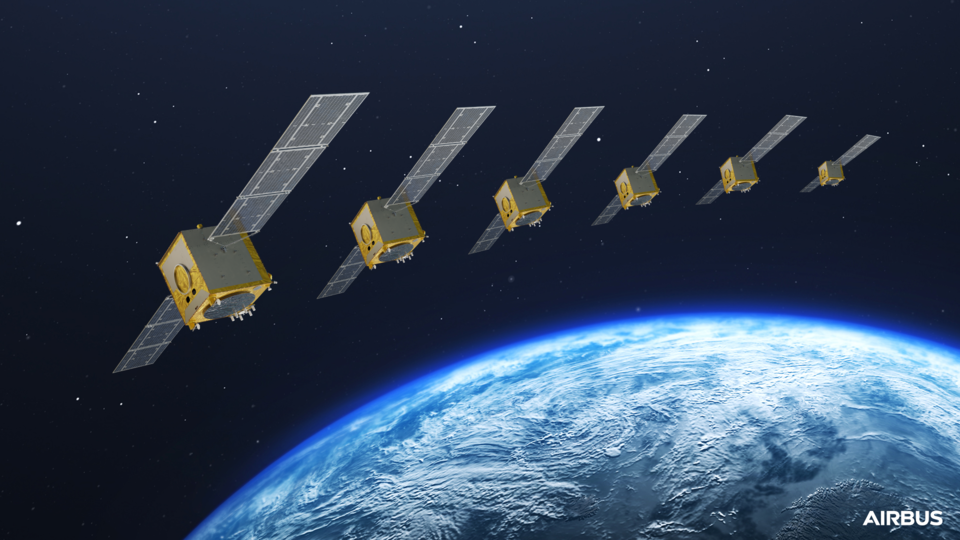Galileo Second Generation enters full development phase
Update July 2023:
Three more contracts for Galileo’s Second Generation development have been signed by ESA, on behalf of EUSPA, with respectively GMV (Spain) for the Ground Control Segment, Thales (France) for Security Monitoring and Thales Alenia Space (France) on the Ground Mission Segment. In total, an amount of approximately €900 million has been awarded since summer 2022 which will lead forward the development of Galileo’s Second Generation to provide more robust, resilient, and new services in the near future for users worldwide.
The main procurements batch of Galileo Second Generation initiated last summer has been finalised, leaving the system ready for its In Orbit Validation development phase. Today, following the opening session of the European Navigation Conference (ENC), ESA Director of Navigation Javier Benedicto invited Thales (Italy), Airbus Defence and Space (Germany) and Thales Six GTS (France) to sign the respective contracts commencing System Engineering Support for the next generation of Europe’s navigation satellite system.

Today, with 28 satellites in orbit, Galileo is the world’s most precise satellite navigation system, providing metre-level accuracy to more than four billion users around the globe. There are currently 10 further Galileo satellites due to be launched, after which the first of the Galileo Second Generation (G2) satellites with enhanced capabilities are expected to begin joining the constellation later in the coming years.
Satellite-building contracts have already been awarded in May 2021 to Thales (Italy) and Airbus Defence & Space (Germany) to create two independent families of satellites amounting to 12 G2 satellites in total, as well as separate contracts with Safran Electronics & Defence - Navigation & Timing (France) and Leonardo (Italy) covering the ultra-precise atomic clocks carried aboard.

Following a new procurement batch in summer 2022, all of the other fundamental building blocks for Galileo Second Generation are now ready to be built with European industry, such as the system testbeds, its ground segment and engineering support.
ESA, acting on behalf of the European Union Agency for the Space Programme (EUSPA) as Galileo’s design authority and system development prime, has in recent months awarded up to one billion Euros in contracts, which bring the overall commitment in Galileo Second Generation close to three billion Euros in this Financial Framework.

With the European satnav community gathering at ESA’s ESTEC in the Netherlands for the annual edition of the European Navigation Conference (ENC), this year hosted by the Netherlands Institute of Navigation (NIN) around the theme of resilience, ESA provided an update during yesterday's opening session on the development of Galileo Second Generation and invited all industrial partners that act as Primes in G2 activities: Thales (Italy), Airbus Defence & Space (Germany), GMV (Spain), Thales (France), Thales Six GTS (France), Tecnobit (Spain), Leonardo (Italy) and Safran Electronics & Defence – Navigation & Timing (France).
Finally, Thales Alenia Space (Italy), Airbus Defence & Space (Germany) and Thales Six GTS (France) representatives were present to sign four contracts for system engineering and technical assistance (SETA), gathering key European experts to provide assistance to ESA in its role as system prime in areas such as Engineering, Signal and Performance, Assembly Integrity and Verification and Security and PRS.

The industrial family is now almost complete, with still two contracts for Security Chain and PRS System Test Bed to be awarded in the next weeks.
Javier Benedicto, ESA Director of Navigation, comments: “Galileo has always been intended as a permanent resource benefiting the lives of European and world citizens, and Galileo Second Generation will ensure the system goes forward into the future with novel capabilities and additional robustness, to ensure that Galileo services are available and reliable wherever and whenever they are needed.”
Ennio Guarino, ESA's Head of Galileo and EGNOS Programmes Department, stated: “The state-of-the-art G2 satellites will represent a major step forward on what has gone before and will incorporate numerous technology upgrades, developed through EU and ESA research and development programmes H2020 and Horizon Europe.”

Employing electric propulsion for the first time, and hosting a higher-strength navigation antenna, the satellites will incorporate six (rather than four) enhanced atomic clocks as well as inter-satellite links, allowing them to communicate and cross-check with one another. They will be controllable with an increased data rate to and from the ground and will operate for 15 years in orbit.
In addition, G2’s fully digital payloads are being designed to be easily reconfigured in orbit, enabling them to actively respond to the evolving needs of users with novel signals and services.
Miguel Manteiga Bautista, ESA Head of Galileo Second Generation, highlighted during the ENC opening session the advantages of the future Galileo generation: “As part of the overall Galileo programme, G2 aims to ensure both the long-term provision of Galileo legacy services that more than four billion people around the globe have come to rely on and the exponential evolution of Galileo activities in the coming years, fostering the leading role of European industry across the positioning, navigation, and timing sector.”

About Galileo
Galileo is currently the world’s most precise satellite navigation system, serving four billion users around the globe since entering Initial Services. All smartphones sold in the European Single Market are now guaranteed Galileo-enabled. In addition, Galileo is making a difference across the fields of rail, maritime, agriculture, financial timing services and rescue operations.
Galileo is a flagship programmes of the EU Space Programme, managed and funded by the European Union. Since its inception, ESA leads the design and development of the space and ground systems, as well as procuring launches. EUSPA (the EU Agency for the Space Programme) acts as the service provider of Galileo, overseeing the market and application needs and closing the loop with users.
For more info about Galileo: https://www.usegalileo.eu/EN/.















 Germany
Germany
 Austria
Austria
 Belgium
Belgium
 Denmark
Denmark
 Spain
Spain
 Estonia
Estonia
 Finland
Finland
 France
France
 Greece
Greece
 Hungary
Hungary
 Ireland
Ireland
 Italy
Italy
 Luxembourg
Luxembourg
 Norway
Norway
 The Netherlands
The Netherlands
 Poland
Poland
 Portugal
Portugal
 Czechia
Czechia
 Romania
Romania
 United Kingdom
United Kingdom
 Slovenia
Slovenia
 Sweden
Sweden
 Switzerland
Switzerland



























